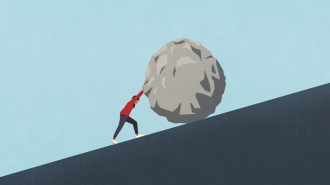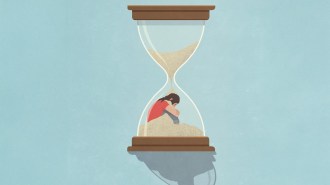Easing test anxiety boosts low-income students’ biology grades
Simple psychological tricks could boost confidence before STEM-subject exams

STRESS REDUCER Helping low-income biology students manage test anxiety improves scores, a new study finds. Such interventions might help these students stay on the high school science track.
Kali9/iStock.com
At a large Midwestern high school, almost 40 percent of low-income biology students were poised to fail the course. Instead, thanks to simple measures aimed at reducing test anxiety, that failure rate was halved.
Psychological interventions that improve grades could ultimately help keep more low-income students in the sciences, says Christopher Rozek, a psychologist at Stanford University and lead author of the study, which appears online the week of January 14 in the Proceedings of the National Academy of Sciences.
Low-income students are much less likely than high-income students to complete four years of high school science. That leads to those students being less likely, or unable, to major in science and math in college or to pursue related — often lucrative — careers in adulthood. One of the many factors underlying this achievement gap is low-income students’ internalized feelings of inadequacy in such fields, Rozek says. Those feelings often translate to high pretest anxiety and worse grades.
In previous, smaller studies, researchers have shown that reducing performance anxiety can improve test scores. To scale up that work, Rozek and colleagues recruited 1,175 freshman biology students at a public high school in Illinois; 285 of those students came from a low socioeconomic background. At the school, slightly over half of low-income students fail their final biology exams compared with just 6 percent of high-income students.
Rozek’s group investigated whether 10-minute-long reading and writing prompts before an exam could improve test performance. Students were placed in one of four groups. A control group was simply told to ignore anxiety. Another group of students wrote about their fears, a method intended to clear up the headspace needed to focus on an exam (SN: 2/12/11, p. 9). A third group read a statement explaining that the physiological responses to stress, such as a racing pulse or sweaty palms, can actually be beneficial and help with attention. Students in a fourth group participated in both activities.
Of 205 low-income students in the three experimental groups, 168, or 82 percent, passed their exams, compared with just 49 of 80 students, or 61 percent, in the control group. The three types of interventions all worked equally well.
Higher-income students, though, experienced no benefit. Rozek suspects that these students were already more adept at emotional regulation.
Robert Tai, a science education expert at the University of Virginia in Charlottesville, questions the study’s emphasis on passing exams. “Improving a student’s test scores will not improve the rate of them pursuing the sciences,” says Tai, whose research has shown that students’ interest in math or science matters more than grades when it comes to later career trajectories.
Psychological interventions of this sort don’t close the achievement gap, Rozek says. But the study illustrates that at least part of a test score has less to do with knowledge of the material than mind-set. And tipping scores even slightly has real-world implications. “You can imagine students who are failing science courses maybe can’t even register for additional science courses,” Rozek says.







